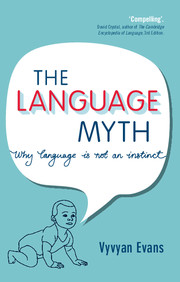Book contents
- Frontmatter
- Dedication
- Epigraph
- Contents
- Acknowledgements
- 1 Language and mind rethought
- 2 Is human language unrelated to animal communication systems?
- 3 Are there language universals?
- 4 Is language innate?
- 5 Is language a distinct module in the mind?
- 6 Is there a universal Mentalese?
- 7 Is thought independent of language?
- 8 Language and mind regained
- Notes
- References
- Index
8 - Language and mind regained
Published online by Cambridge University Press: 05 October 2014
- Frontmatter
- Dedication
- Epigraph
- Contents
- Acknowledgements
- 1 Language and mind rethought
- 2 Is human language unrelated to animal communication systems?
- 3 Are there language universals?
- 4 Is language innate?
- 5 Is language a distinct module in the mind?
- 6 Is there a universal Mentalese?
- 7 Is thought independent of language?
- 8 Language and mind regained
- Notes
- References
- Index
Summary
In this book I’ve been considering the myth of the language instinct: the ‘language myth’. The language myth is made up of six component myths. These include the myth that language is a singularity, unrelated to any other animal communication system (Chapter 2); the myth that all languages are underwritten by language universals, a detailed Universal Grammar (Chapter 3); the myth that this Universal Grammar is innate, prescribed by our DNA (Chapter 4); the myth that Universal Grammar is a distinct, informationally encapsulated module in the mind (Chapter 5); the myth that natural languages are learnable because there is an innate Mentalese: the language of thought (Chapter 6); and finally, the myth that habitual patterns of thought can’t be influenced by the structure and organisation of different languages, which refutes the principle of linguistic relativity (Chapter 7).
While I’ve presented my alternative to each of the myths as we’ve gone along, we still need to round out the language-as-use thesis. And in this final chapter, I examine several outstanding issues.
- Type
- Chapter
- Information
- The Language MythWhy Language Is Not an Instinct, pp. 229 - 258Publisher: Cambridge University PressPrint publication year: 2014



